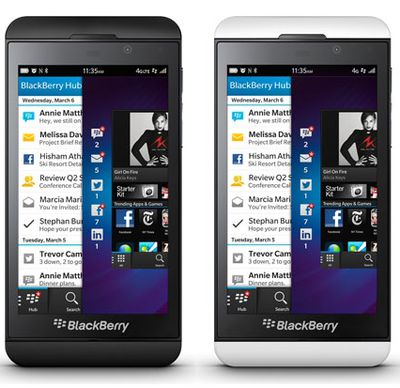RIM Launches Next-Generation BlackBerry Z10, Announces Corporate Rebranding
Research in Motion today announced its next-generation smartphone, the Z10. RIM also announced a corporate rebranding, officially changing the name of the company to BlackBerry.

All four U.S. carriers are expected to carry the Z10, shipping in March and starting at $199 with a two-year contract. Walt Mossberg, reviewing the Z10 for the Wall Street Journal, notes that a physical keyboard-equipped Q10 model is due in April as well. He notes that in "moderate to heavy use", the battery didn't last as long as a charge on an iPhone 5 in similar usage, but he did have some praise for the device.
BlackBerry has always leaned heavily on its physical keyboard, and, according to Mossberg, the virtual keyboard on the Z10 shines as well:
The Z10 keyboard is the best and fastest out-of-the-box virtual keyboard I’ve used. Master BlackBerry thumb typists might not find it as fast as the traditional physical keyboard, but, for a one-finger typist like me, it was faster and more accurate than either the native keyboards on the iPhone or Android. This is partly because it features predictive typing. It displays words that are likely to come next right above the rows of letters, and lets you flick these words upward into the text you’re composing. It learns what mistakes you typically make in hitting letters, and adjusts. And it learns words and abbreviations you frequently use, even proper names.
The company promises 70,000 apps at launch, including staples like Facebook, Twitter, Angry Birds, MLB, and more. Many notable apps are missing however, including Pandora, Spotify and Netflix.
The Z10 comes with a 4.2" 1280x768 display, giving it a higher pixel density than the iPhone 5; an 8 megapixel rear camera; 16GB capacity only, but includes a card slot for storage upgrades; available in white or black; a removable battery; and LTE support, though Mossberg got extremely poor data speeds on AT&T and RIM couldn't explain why.
Popular Stories
Despite being more than two years old, Apple's AirPods Pro 2 still dominate the premium wireless‑earbud space, thanks to a potent mix of top‑tier audio, class‑leading noise cancellation, and Apple's habit of delivering major new features through software updates. With AirPods Pro 3 widely expected to arrive in 2025, prospective buyers now face a familiar dilemma: snap up the proven...
Apple plans to release an all-new super thin iPhone this year, debuting it alongside the iPhone 17, iPhone 17 Pro, and iPhone 17 Pro Max. We've seen pictures of dummy models, cases, and renders with the design, but Lewis Hilsenteger of Unbox Therapy today showed off newer dummy models that give us a better idea of just how thin the "iPhone 17 Air" will be.
The iPhone 17 Air is expected to be ...
If you missed the video showing dummy models of Apple's all-new super thin iPhone 17 Air that's expected later this year, Sonny Dickson this morning shared some further images of the device in close alignment with the other dummy models in the iPhone 17 lineup, indicating just how thin it is likely to be in comparison.
The iPhone 17 Air is expected to be around 5.5mm thick – with a thicker ...
A developer has demonstrated Windows 11 ARM running on an M2 iPad Air using emulation, which has become much easier since the EU's Digital Markets Act (DMA) regulations came into effect.
As spotted by Windows Latest, NTDev shared an instance of the emulation on social media and posted a video on YouTube (embedded below) demonstrating it in action. The achievement relies on new EU regulatory...
While the iPhone 17 Pro and iPhone 17 Pro Max are not expected to launch until September, there are already plenty of rumors about the devices.
Below, we recap key changes rumored for the iPhone 17 Pro models as of April 2025:
Aluminum frame: iPhone 17 Pro models are rumored to have an aluminum frame, whereas the iPhone 15 Pro and iPhone 16 Pro models have a titanium frame, and the iPhone ...
Apple's iPhone development roadmap runs several years into the future and the company is continually working with suppliers on several successive iPhone models simultaneously, which is why we often get rumored features months ahead of launch. The iPhone 17 series is no different, and we already have a good idea of what to expect from Apple's 2025 smartphone lineup.
If you skipped the iPhone...
Apple seeded the third beta of iOS 18.5 to developers today, and so far the software update includes only a few minor changes.
The changes are in the Mail and Settings apps.
In the Mail app, you can now easily turn off contact photos directly within the app, by tapping on the circle with three dots in the top-right corner.
In the Settings app, AppleCare+ coverage information is more...
While the so-called "iPhone 17 Air" is not expected to launch until September, there are already plenty of rumors about the ultra-thin device.
Overall, the iPhone 17 Air sounds like a mixed bag. While the device is expected to have an impressively thin and light design, rumors indicate it will have some compromises compared to iPhone 17 Pro models, including only a single rear camera, a...























